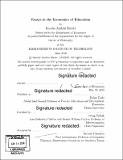| dc.contributor.advisor | Esther Duflo and Parag Pathak. | en_US |
| dc.contributor.author | Zárate, Román Andrés(Zárate Vasquez) | en_US |
| dc.contributor.author | Angrist, Joshua David, | en_US |
| dc.contributor.author | Pathak, Parag A., | en_US |
| dc.contributor.other | Massachusetts Institute of Technology. Department of Economics. | en_US |
| dc.date.accessioned | 2019-09-16T20:58:54Z | |
| dc.date.available | 2019-09-16T20:58:54Z | |
| dc.date.copyright | 2019 | en_US |
| dc.date.issued | 2019 | en_US |
| dc.identifier.uri | https://hdl.handle.net/1721.1/122118 | |
| dc.description | Thesis: Ph. D., Massachusetts Institute of Technology, Department of Economics, 2019 | en_US |
| dc.description | Cataloged from PDF version of thesis. "The third chapter (co-authored with Joshua Angrist and Parag Pathak)"--Page 3. | en_US |
| dc.description | Includes bibliographical references. | en_US |
| dc.description.abstract | This thesis consists of three chapters that study how characteristics of peers and schools affect human capital. The first chapter reports estimates of academic and social peer effects from a large-scale field experiment at selective boarding schools in Peru. The experimental design overcomes some methodological challenges in the peer effects literature. I randomly varied the characteristics of neighbors in dormitories with two treatments: (a) less or more sociable peers (identified by their position in the school's friendship network before the intervention) and (b) lower- or higher-achieving peers (identified by admission test scores). While more sociable peers enhance the formation of social skills, higher-achieving peers do not improve academic achievement; in fact, they further reduce the academic performance of lower-achieving students. These results appear to be driven by students' self-confidence. | en_US |
| dc.description.abstract | The second chapter studies whether students prefer friends who are similar to them and whether these preferences persist when students have to interact frequently. I use network surveys and exploit variation in the exact position of the students in the allocation to dormitories at selective boarding schools in Peru. Students are more likely to form social relations with peers who are of their same poverty status, academic level, and sociability. However, students who are neighbors in the allocation to dormitories are more likely to become friends, and this occurs regardless of their type. Furthermore, being exposed to peers of a different type also encourages more diverse friendships and study groups that go beyond the neighbors in the dormitories. The third chapter (co-authored with Joshua Angrist and Parag Pathak) evaluates mismatch in Chicago's selective public exam schools, which admit students using neighborhood-based diversity criteria as well as test scores. | en_US |
| dc.description.abstract | Regression discontinuity estimates for applicants favored by affirmative action indeed show no gains in reading and substantial negative effects of exam school attendance on math scores. These results hold for more selective schools and for applicants most likely to benefit from affirmative-action, a pattern suggestive of mismatch. However, exam school effects in Chicago are explained by the high quality of schools attended by applicants who are not offered an exam school seat. Specifically, mismatch arises because exam school admission diverts many applicants from high-performing Noble Network charter schools, where they would have done well. | en_US |
| dc.description.statementofresponsibility | by Román Andrés Zárate. | en_US |
| dc.format.extent | 168 pages | en_US |
| dc.language.iso | eng | en_US |
| dc.publisher | Massachusetts Institute of Technology | en_US |
| dc.rights | MIT theses are protected by copyright. They may be viewed, downloaded, or printed from this source but further reproduction or distribution in any format is prohibited without written permission. | en_US |
| dc.rights.uri | http://dspace.mit.edu/handle/1721.1/7582 | en_US |
| dc.subject | Economics. | en_US |
| dc.title | Essays in the economics of education | en_US |
| dc.type | Thesis | en_US |
| dc.description.degree | Ph. D. | en_US |
| dc.contributor.department | Massachusetts Institute of Technology. Department of Economics | en_US |
| dc.identifier.oclc | 1119389473 | en_US |
| dc.description.collection | Ph.D. Massachusetts Institute of Technology, Department of Economics | en_US |
| dspace.imported | 2019-09-16T20:58:46Z | en_US |
| mit.thesis.degree | Doctoral | en_US |
| mit.thesis.department | Econ | en_US |

